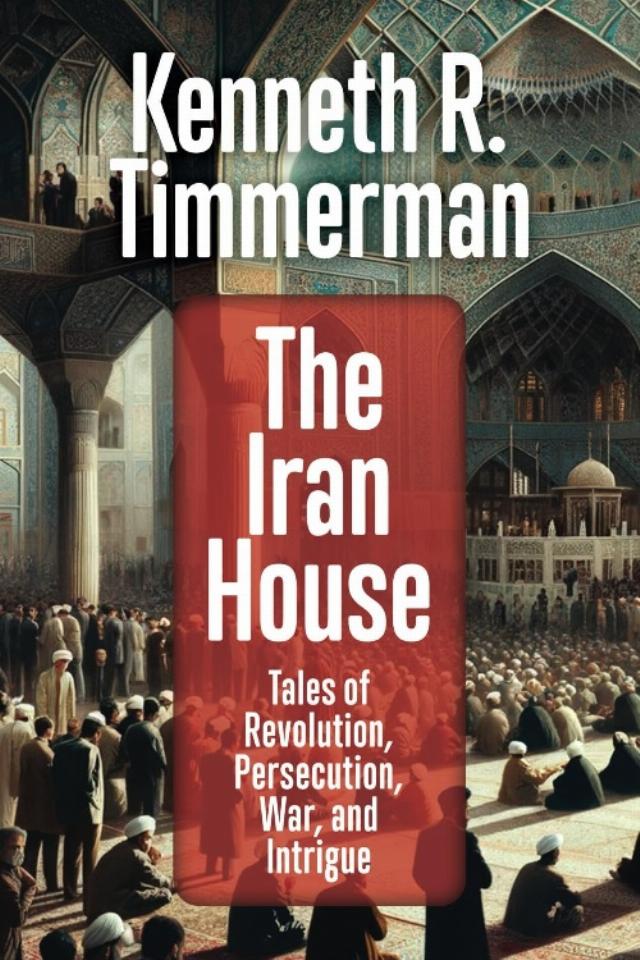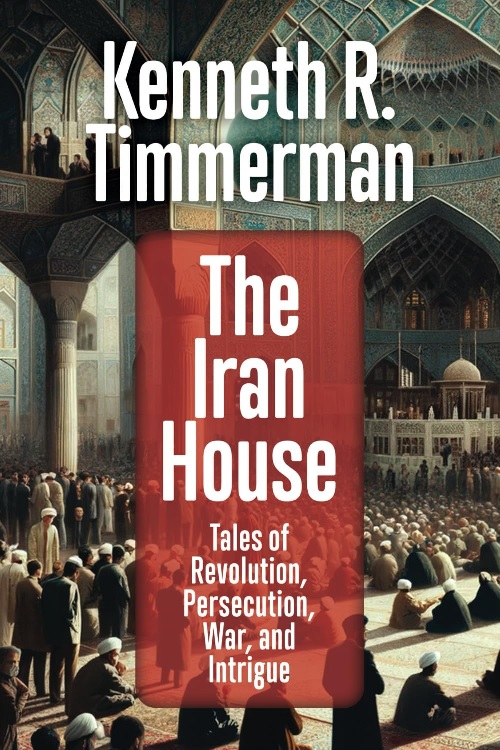

Bombardier Books
Did Biden's 2020 campaign team attempt to create an "October Surprise" with the help of the Iranians?President Trump has said many times on the campaign trail that he was close to getting a deal with Iran during his first term. And then, something happened.
That something was the killing of three U.S. contractors in Iraq by Iranian proxies and the assault on the U.S. Embassy in Baghdad in late December 2019.
I was working undercover at the time for the U.S. intelligence community running a network of Iranian sub-agents. Some of them had demonstrated access to the Supreme Leader’s Intelligence Office in Tehran. That’s about as good as it gets, and no one else had it.
My Iranian sub-agents were warning that the assault on the U.S. Embassy in Baghdad was far more serious than it appeared. That led President Trump to airlift 100 U.S. Marines from Kuwait to protect the Baghdad Embassy, and days later, on January 2, 2020, to order the killing of Quds Force commander Qassem Suleimani.
Only later did I learn from a different Iranian sub-source that the Baghdad embassy attack was not just an Iranian operation. It had been motivated — indeed, solicited — in large part by a senior advisor to former vice-president Joe Biden, who was seeking ways of destroying Trump’s chances of re-election in 2020.
In a series of electronic communications in the late summer of 2019, the senior Biden advisor made a “request” of Iranian foreign minister Mohammad Javad Zarif. This advisor knew Zarif well from his time as a senior official in the Obama administration. After Trump came to the White House, the two men maintained their friendship and met periodically on the sidelines of international fora, where they lamented the demise of a “rational” U.S. policy toward Iran.
On August 11, 2019, the advisor made his initial pitch to Zarif that the Democrats and the Iranian regime shared an interest in maintaining the framework of the 2015 nuclear deal. Since Trump had withdrawn U.S. participation in the agreement one year earlier, they needed to take action that would “put pressure on our enemy,” and keep him “on the run.” That enemy, shared by the Democrats and by the Iranian regime, was Donald Trump.
On August 14, the Biden advisor sent a second, more explicit message, asking the Iranian regime to “do the same thing in Baghdad that you did with our embassy in Tehran” in 1979.
Biden’s advisor pledged to protect the Iranians from retaliation for their actions against the U.S. embassy in Baghdad, or in the Persian paraphrase Zarif later sent to the Supreme Leader’s office and to Quds Force commander Qassem Soleimani, “to keep the fire away from your house.”
Democrats have been obsessed with the 1979 Tehran hostage crisis ever since that time, and to this day many believe that Ronald Reagan and his campaign made a deal with advisors to Ayatollah Khomeini to hold onto the hostages until after the 1980 election. This is the origin of the well-worn phrase, “October surprise.”
They undoubtedly thought the Iranians could help them pull off an “October surprise” against Donald Trump, except that they would start their assault on his credibility as commander-in-chief in January 2020, giving Democrat operatives and their allies in the media ten full months to hound Trump for being weak, just as Ted Koppel hounded Jimmy Carter throughout the 444 days of the Tehran hostage crisis in 1979.
The correspondence was kept in the classified archives of the Office of the Supreme Leader, where it was assigned folder number 98-52371-K.M. (1398 was the Persian <img alt captext="Bombardier Books” class=”post-image-right” src=”https://conservativenewsbriefing.com/wp-content/uploads/2024/11/the-iran-deal-the-democrats-killed.jpg” width=”400″>calendar year corresponding to 2019). In addition to the U.S.-Iran correspondence, the folder contained documents relating to the Supreme Leader’s fatwa, or religious edict, authorizing the assassination of President Trump and Saudi Crown Prince Mohammad Bin Salman for their role in the Soleimani assassination.
Copies of Iran’s “Biden file” were made by a senior military intelligence official in the Supreme Leader’s office, who shared them with a handful of confidants. One of those confidants provided me with a facsimile of the first two documents in the original Persian, rough English translations of others, and an index of the entire file. There were ten memos in all.
I provided the name of that confidant to the FBI, who were able to corroborate his affiliation and career path. In other words, he was in the “registry” of Iranian intelligence officials kept by the U.S. intelligence community. My handlers understood that he was the real deal.
But I went further than that. I helped set up a face-to-face meeting between my sub-source and officials from the FBI’s Washington Field Office at an overseas location. My sub-source provided them with additional details on how he had acquired the “Biden-Iran file,” and the identity of the Biden staffer who had asked the Iranian regime to take U.S. diplomats hostage.
That Biden staffer continues to hold a senior position in the White House today and will undoubtedly serve under Kamala Harris should she win the presidency. Once Biden won the White House, I was told to not mention this case again in my official dealings with the FBI.
President Trump gave me a rare hat-tip for my role in helping to prevent a catastrophic hostage-taking at a campaign rally in Jacksonville, Florida, on September 24, 2020.
I was seated in the third row along with the Florida Congressional delegation. To my left was Rep. Matt Gaetz. Just behind me was my own congressman, John Rutherford. We were at the president’s nine o’clock.
You can watch this interchange on a Facebook capture from C-Span if you fast-forward to the 26 minute mark. The president begins by introducing the congressmen, then he says this:
“We also have some of our really unbelievable undercover operatives. And if you don’t mind, I won’t introduce them. Alright? I don’t think we’re going to introduce them. I want to so badly. I wanna have them stand up, bring them up here. I want to hug them and kiss them, which I’m not allowed to do because they’re so so good. But somehow they may lose some effectiveness if I introduce ‘em. So they’re in the crowd. I saw two of ‘em. And I won’t bother. But they are great great champions of our country. Thank you.”
At that point, the crowd cheered and the president looked in the direction of the Florida congressmen and smiled. I can guarantee you that the congressmen were not undercover operatives.
President Trump undoubtedly believes he can still negotiate a deal with the Iranian mullahs. If I have the opportunity, I will counsel him against it. Why? Because any deal they would accept — say, to limit their production of nuclear weapons material — would be a fake. It would have to be fake, because if they negotiated away their nuclear capabilities they would quickly be ousted from power.
Iran’s nuclear capabilities are one of the bulwarks of the Islamic regime, much as the doctrine of absolute clerical rule. Take it away, and the regime crumbles. The next president needs to focus on delegitimizing the regime, not negotiating with it.
Adapted from The Iran House: Tales of Revolution, Persecution, War, and Intrigue, published by Bombadier Books on October 8, 2024). Kenneth R. Timmerman is a senior fellow at the America First Policy Institute and the author of 14 works of non-fiction and four novels. He was nominated for the Nobel Peace Prize for his work on Iran in 2006.
Image: Bombardier Books




